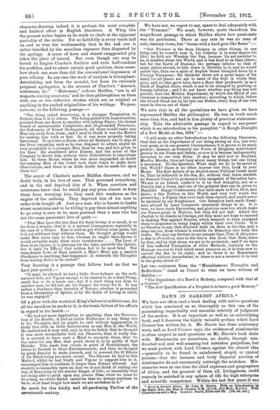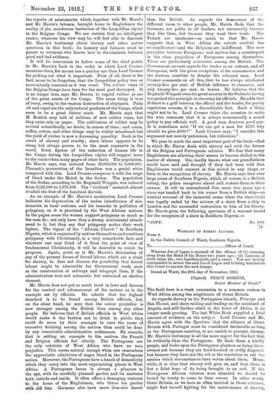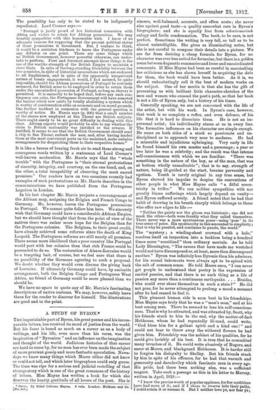DAWN IN DARKEST AFRICA.*
WE have not often read a book dealing with native questions which has convinced us so thoroughly as this one of the painstaking impartiality and essential sobriety of judgment of the imithor. It is an important as well as an entertaining book, and it deserves the highly valuable preface which Lord Cromer has written for it. Mr. Harris has- done missionary work, and, as Lord Cromer says, the evidence of . missionaries is often suspect in such questions as Mr. Harris's book deals with. Missionaries err sometimes, no doubt, through mis- directed zeal and well-meaning but mistaken prejudices, but we must protest, with Lord Cromer, against the absurd idea —generally to be found in uninformed, stupid, or cynical persons—that the humane and truly Imperial services of missionaries do not enormously outweigh the mistakes. Mis- sionaries were at one time the chief explorers and geographers of Africa, and the greatest of them all, Livingstone, could . scarcely be matched in any sphere of life for high enterprise and scientific competence. Within the last few years it was • Dawn in DarkestAfrica. By John H. Harris. With an Introduction bb the Right Hon. the Earl of Cromer, 6.M. G.C.B., !Lear. With Illustrations and a Map. London : Smith, 'Elder and Co. [10s. Bd. net.]
the reports of missionaries which, together with Mr. Morel's and Mr. Harris's labours, brought home to Englishmen the reality of,,the murderous barbarism of the Leopoldian regime in the Belgian Congo. We are certain that no intelligent reader, whatever his view may be, will feel able to discount Mr. Harris's testimony about slavery and other native questions in this book; its honesty and fairness must be patent to everyone who knows how to discriminate between good and bad evidence.
It will be convenient to follow some of the chief points in Mr. Harris's book in the order in which Lord Cromer mentions them, for no one has a quicker eye than Lord Cromer for picking out what is important. First of all, there is the fact, never to be forgotten, that the Leopoldian policy was as economically unsound as it was cruel. The rubber vines of the Belgian Congo have been for the most part destroyed. It is no longer true, says Mr. Harris, to regard rubber as one of the great assets of the Congo. The same thing is true of ivory, owing to the wanton destruction of elephants. Palm oil and copal are the only natural products of the Congo, which seem to be a great future asset. Mr. Harris says that M. Renkin may talk of millions of new rubber vines, but they exist only on paper. The cultivation of rubber may be revived scientifically, no doubt, in course of time ; and cocoa, coffee, cotton, and other things may be widely introduced, but the yield of rubber is now a decreasing quantity. Such is the result of slavery and cruelty ; slave labour appears to be cheap but always proves to be the most expensive in the world. Some figures of the reduction of human life in the Congo during the. Leopoldian regime will suggest more to the reader than many pages of other facts. The population, Mr. Harris says, was reduced from 20,000,000 to 8,000,000. Pharaoh's persecution of the Israelites was a genial whim compared with this. Lord Cromer compares it with the reign of blood under the Mandi in the Sudan. The population of the Sudan, according to Sir Reginald Wingate, was reduced from 8,525,000 to 1,870,500. The " civilized " monarch almost rivalled the feat of the fanatical dervish.
As an example of Mr. Harris's moderation Lord Cromer indicates his deprecation of the undue interference of mis- sionaries in local customs, and his remarks in palliation of polygamy, as it is practised by the West African natives. In the pagan areas the women support polygamy as much as the men do ; not only have they a strong sentimental attach- ment to it, but they say that polygamy makes their work lighter. The vigour of the "African Church " in Southern Nigeria, which is organised by natives themselves, and combines polygamy with Christianity, is a very remarkable fact, and whatever one may think of it from the point of view of fundamental Christianity, it will be desirable to watch its progress. Again, great as is Mr. Harris's detestation of any of the present forms of forced labour, which are a cloak for slavery, he does not dismiss the possibility that forced labour might be admissible for Government work, such as the construction of railways and telegraph lines, if the administration were not autocratic but contained an elective element.
Mr. Harris does not put so much trust in laws and decrees for the control and advancement of the natives as in the example set by officials. He admits that the highest standard is to be found among British officials, but, on the other hand, he says that the colour prejudice is now stronger among the British than among any other people. He believes that if British officials in West Africa would make it the fashion not to drink in public they could do more by their example to cure the curse of excessive drinking among the natives than could be done by any conceivable administrative ordinances. He remarks that in setting an example to the natives the French and Belgian officials fail utterly. The Portuguese are the only colonists of West Africa who have no race prejudice. This seems natural enough when one remembers the appreciable admixture of negro blood in the Portuguese nation. Moreover, the Portuguese have a knack of domesticity which they carry into the most unpromising places in West Africa. A Portuguese house is always a pleasure to the eye, with its carefully planned garden and its neatness both outside and inside. It often offers a damaging contrast to the home of the Englishman, who litters his garden with old tins. Germans also have more domestic knack than the British. As regards the demeanour of the different races to other people, Mr. Harris finds that the Germans are polite to all traders, not necessarily because they like them, but because they want their trade. The French are intolerant—so much so that Mr. Harris suggests that in West Africa the entente cordiale has no significance—and the Belgians are indifferent. The race prejudice between Europeans and natives has a counterpart in the class prejudices of Europeans among themselves. These are particularly noticeable among the British. The Government servant regards the trader as an outcast, and all Europeans, with the pious exceptions of the missionaries and the doctors, combine to despise the coloured man. Lord Cromer comments on all this, that he has always attributed seventy-five per cent. of British influence to character, and only twenty-five per cent. to brains. He believes that Sir Reginald Wingate owes his great success in the Sudan to having recognized this principle in choosing his officials. He adds that if there is a gulf between the official and the trader, for purely capricious reasons, it is a discreditable fact. Such a thing ought not to be. Lord Cromer takes the occasion to make the wise comment that it is always economically a sound policy to pay officials well. A good man deserves good pay. It is sometimes said, "If we can get a man for £250 why should we give 2500 ? " Lord Cromer says, " I consider this argument not merely pernicious, but ridiculous."
We pass to much the most important part of the book—that in which Mr. Harris deals with slavery and with the future of the Belgian and Portuguese colonies. We fear that many Englishmen are allowing their senses to become dulled in the matter of slavery. One hardly knows what our grandfathers would have said and thought if they had been told that Englishmen would consent at this period in any shape or form to the recognition of slavery. Mr. Harris says that over large areas of Southern Nigeria, which, of course, is a British colony, the police recapture slaves and restore them to their owners. It will be remembered that some two years ago a slave was handed back to his owner from a British ship—an ironical reversal of the immortal scene when the slave trade was legally ended by the seizure of a slave from a ship in London and the successful restoration to him of his liberty. Mr. Harris gives the following specimen of a warrant issued for the recapture of a slave in Southern Nigeria
" COPY. No. 1881
74 WASEANT TO ARREST ACCUSED.
Form 2.
In the Native Council of Warri, Southern Nigeria.
To Officer of Court.
Whereas Joe of Lagos is accused of the offence of (1) running away from the Head of his House two years ago ; (2) Larceny of cloth value 16s., two handkerchiefs, and a canoe. You are hereby commanded to arrest the said Joe of Lagos and to bring him before this Court to answer the said charge.
Issued at Warn, the 28th day of November, 1910.
(Signed) PERCY GORDON, Senior Member of Court."
The fault here is a weak concession to a common custom in West Africa among the neighbours of Great Britain.
As regards slavery in the Portuguese islands, Principe and San Thome, and slave raiding and trading on the mainland of Angola, and still further afield in the heart of Africa, it no longer needs proving. The last White Book supplied a fatal amount of evidence on the subject. Lord Cromer and Mr. Harris agree with the Spectator that the alliance of Great Britain with Portugal must be considered intolerable so long as the Portuguese sanction, or are unable to prevent, slavery. Mr. Harris's testimony is all the more cogent for the fact that he evidently likes the Portuguese. He finds them a kindly people, and looks upon the Portuguese planters as being slave- owners not because they are hard-hearted or evilly disposed, but because they have not the wit or the resolution to cut the meshes which circumstances have woven about them. Mean- while, it is clear that slavery still goes on, and that there is but a faint hope of its being brought to an end. If the Portuguese African colonies were attacked we should be bound by treaty to come to their rescue. In other words, Great Britain, as we have so often insisted in these columns, might find herself fighting for the maintenance of slavery, The possibility has only to be stated to be indignantly repudiated. Lord Cromer says :—
" Portugal is justly proud of her historical connexion with Africa and wishes to retain. her African possessions. We may heartily sympathize with this honourable wish. I know of no adequate reasons for supposing that the present political status of those possessions is threatened. But, I venture to think, it would be a mistaken kindness to leave the Portuguese under any delusion on one point. There are some things which no British Government, however powerful otherwise, can under- take to perform. First and foremost amongst those things is the use of the warlike strength of the British Empire to maintain a slave State. In spite of the long-standing friendship between the two countries, in spite of historical associations which are endeared to all Englishmen, and in spite of the apparently unequivocal nature of treaty engagements, it would, I feel assured, be quite impossible, should the African possessions of Portugal be seriously menaced, for British arms to be employed in order to retain them under the uncontrolled possession of Portugal, so long as slavery is permitted. It is earnestly to be hoped that, before any such con- tingency can arise, the Portuguese Government will have removed the barrier which now exists by totally abolishing a system which is worthy of condemnation alike on economic and on moral grounds. One further incident in connexion with the general question is worthy of notice. Mr. Harris says (p. 200) that a small number of the slaves now employed at San Thome are British subjects. There ought surely to be no great difficulty in dealing with this class. African experts would probably be able to say whether the claim to British nationality was justified or the reverse. If justified, it seems to me that the British Government should send a ship to San Thome, embark the men, and, after having landed them at the most convenient ports on the mainland, make suitable arrangements for despatching them to their respective homes."
It is like a breeze of bracing fresh air to read these strong and
courageous words written by a statesman of Lord Cromer's well-known moderation. Mr. Harris says that the " whole trouble" with the Portuguese is "their eternal protestations of sincerity, integrity, and courtesy, on the one hand, and, on the other, a total incapability of observing the most sacred promises." Our readers have on two occasions recently had examples of such protestations as Mr. Harris describes in the • communications we have published from the Portuguese Legation in London.
In his last chapter Mr. Harris projects a rearrangement of the African map, assigning the Belgian and French Congo to Germany. He, however, leaves the Portuguese possessions to Portugal. We cannot quite follow him here. We sincerely wish that Germany could have a considerable African Empire, but we should have thought that from the point of view of the natives there was rather more hope for the Belgian than for the Portuguese colonies. The Belgians, to their great credit, have already achieved some reforms since the death of King Leopold. The Portuguese reforms are still nearly all promises. There seems more likelihood that a poor country like Portugal would part with her colonies than that rich France could be persuaded to do so. The restoration of Alsace-Lorraine would be a tempting bait, of course, but we feel sure that there is no possibility of the Germans agreeing to such a proposal. We doubt whether they would even discuss the giving back of Lorraine. If ultimately Germany could have, by amicable arrangement, both the Belgian Congo and Portuguese West Africa, no friend of Germany could be more pleased than we should be.
We have no space to quote any of Mr. Harris's fascinating descriptions of native customs. We may, however, safely leave these for the reader to discover for himself. The illustrations are good and to the point.
















































 Previous page
Previous page